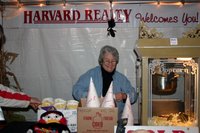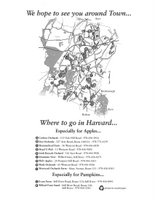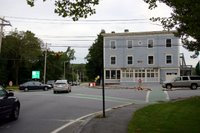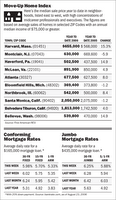"This place is really beautiful, but how will I get to work from here?" We may seem like we are way out in the sticks, but Harvard is about 38 miles northwest of downtown Boston at the intersection of Routes 2 and 495, making us pretty well connected for the majority of commuters. A commute in the car downtown can be over an hour, but Harvard is certainly closer to places like Burlington, Marlborough, Maynard, Lexington, and Waltham.
Directions by car from the center of Harvard to The Prudential Center downtown today are estimated at 54 minutes. Directions from Harvard to Kendall Square are estimated at about 42 minutes. I would add 15 to 20 minutes to account for traffic, unless you commute during off hours.
Another viable option is the commuter rail. Harvard is close to the Fitchburg/South Acton Line and you can take the train from a few different stations nearby. The closest stations to Harvard are the Ayer, Littleton, and South Acton. Parking at the stations can be a little tricky so you should call each municipality and find out parking availability for non-residents. The MBTA estimates 1 hour and 8 minutes from the Littleton Station to the Prudential Center via North Station and 55 minutes from Littleton to Kendall/MIT via Porter Square.
I often suggest that folks interested in in the move west try the commute in order to get a sense of what it is actually like. I can certainly describe the traffic at the Fresh Pond Rotary, but one should really experience this themselves. ;-) As an aside, one tool that I use frequently to check traffic all over the region is SmarTraveler or their automated phone information system at (617) 374-1234. I have called this number countless times when I'm trying to figure out the best route to the Cape on a friday night!
Thursday
What Devens Means to Harvard
"What is happening to Devens?" is a question heard in our office frequently. The most recent article in the Globe sums it all up: "The Future For Devens is Clouded" and for people considering a move to Harvard, the Devens cloud can be a little unsettling.
So first, what is Devens? Devens is what remains of "Fort Devens" an Army training facility built during World War I to train more than 100,000 Army soldiers. The facility was located on more than 5000 acres of land purchased from 112 land owners in the towns of Ayer, Harvard, Lancaster and Shirley. Over the years this facility had been expanded and activated as necessary during wars and military actions.
In 1995, under the national Base Realignment And Closing Act Fort Devens was closed and the State appointed The Massachusetts Government Land Bank (now known as MassDevelopment) to oversee redevelopment efforts. In 1996, MassDevelopment took title of the land with the power to sell and lease the property. Since that time commercial, residential, recreational, and municipal redevelopment has taken place.
This year, after two years of deliberation and upwards of 70 public meetings, the Devens Disposition Executive Board (DDEB) proposed "Scenario 2B". This scenario would apportion some lands back to the surrounding towns and incorporate "Devens" into a municipality by the year 2010. However, this proposal was voted down by the towns of Ayer and Harvard so it is back to the drawing board for the DDEB. Meanwhile, MassDevelopment continues their development efforts and citizens anxiously await the next proposal.
The good and bad news is that the deadline for a decision on the disposition of Devens is not until the year 2033. One hopes that it does not take 29 years for a consensus, but it is difficult to predict. And if the development in Devens continues over the next three decades and proves to be valuable then the question of, "What is happening to Devens?" will be an even more difficult subject for the towns of Ayer, Harvard, Lancaster, and Shirley to agree upon.
I wonder how many public meetings will have taken place by the year 2033?.
So first, what is Devens? Devens is what remains of "Fort Devens" an Army training facility built during World War I to train more than 100,000 Army soldiers. The facility was located on more than 5000 acres of land purchased from 112 land owners in the towns of Ayer, Harvard, Lancaster and Shirley. Over the years this facility had been expanded and activated as necessary during wars and military actions.
In 1995, under the national Base Realignment And Closing Act Fort Devens was closed and the State appointed The Massachusetts Government Land Bank (now known as MassDevelopment) to oversee redevelopment efforts. In 1996, MassDevelopment took title of the land with the power to sell and lease the property. Since that time commercial, residential, recreational, and municipal redevelopment has taken place.
This year, after two years of deliberation and upwards of 70 public meetings, the Devens Disposition Executive Board (DDEB) proposed "Scenario 2B". This scenario would apportion some lands back to the surrounding towns and incorporate "Devens" into a municipality by the year 2010. However, this proposal was voted down by the towns of Ayer and Harvard so it is back to the drawing board for the DDEB. Meanwhile, MassDevelopment continues their development efforts and citizens anxiously await the next proposal.
The good and bad news is that the deadline for a decision on the disposition of Devens is not until the year 2033. One hopes that it does not take 29 years for a consensus, but it is difficult to predict. And if the development in Devens continues over the next three decades and proves to be valuable then the question of, "What is happening to Devens?" will be an even more difficult subject for the towns of Ayer, Harvard, Lancaster, and Shirley to agree upon.
I wonder how many public meetings will have taken place by the year 2033?.
Monday
Halloween Night - On The Common
Harvard residents enjoy quite a spectacle each year on Halloween night. Children trick-or-treat all over town and a large number of hearty souls venture to the town center where from 5 to 8 pm gracious homeowners, the fire department, and our own office open up the doors for hundreds of trick-or-treaters.
It is a community event like no other, where kids of all ages tromp through the center of town for the opportunity to see their friends and classmates in costume. Even parents get into the act with all kinds of hilarious get-ups.
 We look forward to this community event each and every year. It gives us a chance to see the new residents that we have relocated to Harvard and connect with people that have lived in town for years.
We look forward to this community event each and every year. It gives us a chance to see the new residents that we have relocated to Harvard and connect with people that have lived in town for years.
We give away hot dogs, popcorn, apple cider from Carlson Orchards, donuts from Dunkin' Donuts, and more. Next year we expect we'll need more than 1000 hot dogs! One suggestion - arrive early, or you'll have to wait in line for the popcorn!
It is a community event like no other, where kids of all ages tromp through the center of town for the opportunity to see their friends and classmates in costume. Even parents get into the act with all kinds of hilarious get-ups.
 We look forward to this community event each and every year. It gives us a chance to see the new residents that we have relocated to Harvard and connect with people that have lived in town for years.
We look forward to this community event each and every year. It gives us a chance to see the new residents that we have relocated to Harvard and connect with people that have lived in town for years. We give away hot dogs, popcorn, apple cider from Carlson Orchards, donuts from Dunkin' Donuts, and more. Next year we expect we'll need more than 1000 hot dogs! One suggestion - arrive early, or you'll have to wait in line for the popcorn!
Wednesday
The State of Real Estate in Late 2006
Well, it has been a tough year for real estate. The last three or four years had been huge in the Harvard market and prices rose higher than ever. Now we are experiencing what I would frankly say is a "wicked hangover". But what is next? Honestly, no one is quite sure. The Federal Reserve seems focused on keeping rates right where they are, so will that eventually bring more buyers?
At our office, I watch the historical market data carefully. There is so much information available and it is critical when it comes to pricing. As people say all the time, "everything is cyclical". So where are we in the cycle? We are stalled. Issues of affordability, lack of actual home equity, and uncertainty created by negative press have all stopped buyers in their tracks.
At this point however, I do feel strongly that the spring market will be busy. And what I have seen in 2006 is that price sells. But, what else sells? Location and condition. It is really simple, so be realistic about what you have and play to your strengths. Furthermore, unless you have got a priceless gem be ready for either some aggressive pricing or aggressive negotiating!
At our office, I watch the historical market data carefully. There is so much information available and it is critical when it comes to pricing. As people say all the time, "everything is cyclical". So where are we in the cycle? We are stalled. Issues of affordability, lack of actual home equity, and uncertainty created by negative press have all stopped buyers in their tracks.
At this point however, I do feel strongly that the spring market will be busy. And what I have seen in 2006 is that price sells. But, what else sells? Location and condition. It is really simple, so be realistic about what you have and play to your strengths. Furthermore, unless you have got a priceless gem be ready for either some aggressive pricing or aggressive negotiating!
Thursday
The Value of Education- MCAS Ranking

Whether relocating from out of state or making a move from school district to school district, MCAS has become a benchmark with which Buyers compare communities in Massachusetts. For those looking at different communities these rankings are one of many factors to consider when evaluating school districts.
It is important to note that Harvard Elementary and Bromfield (the town's public high school) typically perform very well on the MCAS standardized test and generally rank between 1st and 15th in the state depending on the year and the grade level. Boston.com has compiled a great section of their Website devoted to MCAS. Check out our district's 2006 10th grade ranking.
Congratulations to the teachers, children, teens, parents, and families that all contribute to our continued MCAS success!
Wednesday
A History of Interesting Settlers
The town of Harvard has a history of interesting settlements that are well-documented and somewhat unique. If you have ever looked at a town profile you may have read the following phrase, "...the town has been known for a series of unusual sociological and religious experiments...". The question is, what exactly is one to make of all this? In short, Harvard has always been a place where independent thinkers have settled. It seems that there is a genuine climate of acceptance and tolerance which makes Harvard a really great place! Below is a brief history on what have been called the "unique" settlements. This may provide more insight on the town.
The first documented formal religious community in Harvard were the self-sufficient and industrious Shakers. At their peak, in the late 1790's there were around 200 members living on hundreds, maybe even a thousand acres covering the northeast corner of Harvard. Their settlement ended in 1917 but there are in fact a few remaining Shaker properties privately held, along with public conservation lands & trails throughout a wonderful neighborhood known as Shaker Hills and even a Public Golf Course.
The next settlement sprouted near the Nashua River in 1843. The group was a small commune of transcendental intellectuals who formed to "elevate the spirit and pursue wisdom". However, the group did not survive their first winter. Critics felt that their strategy to operate with total self-sufficiency and their vegetarianism contributed greatly to their downfall. Interestingly, on this land now operates a seasonal museum called Fruitlands that preserves both the local Shaker and Transcendental artifacts.
After that, it took over 100 years for the next settlement to take hold in Still River, not far from Fruitlands. In 1958; St. Benedict's Center, Slaves of the Immaculate Heart of Mary arrived. This settlement of conservative Catholics came to town from Cambridge, MA after their founder had been excommunicated by the Church. They began to farm in Still River and this monastic/agricultural settlement has been there ever since. In 1972, the Church removed censures and by that time the settlement had evolved and the Saint Benedicts Abbey took shape. Both settlements exist their today.
There is more to be learned about these different settlements, much of which is preserved by the Harvard Historical Society, Harvard Conservation Trust, and Fruitlands Museum.
The first documented formal religious community in Harvard were the self-sufficient and industrious Shakers. At their peak, in the late 1790's there were around 200 members living on hundreds, maybe even a thousand acres covering the northeast corner of Harvard. Their settlement ended in 1917 but there are in fact a few remaining Shaker properties privately held, along with public conservation lands & trails throughout a wonderful neighborhood known as Shaker Hills and even a Public Golf Course.
The next settlement sprouted near the Nashua River in 1843. The group was a small commune of transcendental intellectuals who formed to "elevate the spirit and pursue wisdom". However, the group did not survive their first winter. Critics felt that their strategy to operate with total self-sufficiency and their vegetarianism contributed greatly to their downfall. Interestingly, on this land now operates a seasonal museum called Fruitlands that preserves both the local Shaker and Transcendental artifacts.
After that, it took over 100 years for the next settlement to take hold in Still River, not far from Fruitlands. In 1958; St. Benedict's Center, Slaves of the Immaculate Heart of Mary arrived. This settlement of conservative Catholics came to town from Cambridge, MA after their founder had been excommunicated by the Church. They began to farm in Still River and this monastic/agricultural settlement has been there ever since. In 1972, the Church removed censures and by that time the settlement had evolved and the Saint Benedicts Abbey took shape. Both settlements exist their today.
There is more to be learned about these different settlements, much of which is preserved by the Harvard Historical Society, Harvard Conservation Trust, and Fruitlands Museum.
Tuesday
Picking Your Own Apples - Where to Go in Harvard

It's Fall, the real estate market is slowing for the season, the air is crisper, and the sun just glimmers. This time each year I enjoy my seasonal apple obsession. Drawn to the local orchards and farm stands, I keep an eye out for the best varieties of apples to use for baking apple pies. I am still perfecting techniques and working towards that day when the cook book is left on the shelf and I am able to create my baking from memory!
Everyone should know that there are a number of quality local orchards to visit and make for a wonderfully idyllic afternoon. Orchards offering "pick your own" experiences, in the town of Harvard are compiled by the Harvard Conservation Trust in a handy flyer at left. Please call before you set out, to ensure the orchard you are interested in visiting is open. Harvard Conservation Trust Flyer.
Wednesday
The Town of Harvard and its Schools - The Bromfield School History

Ask around town and every once in a while you might meet a Harvard resident that attended the original Bromfield School. This landmark building, under renovation today, was made possible by a generous private donation from Margaret Bromfield Blanchard in 1876.
This high school opened in September of 1878 with a total of 40 students. Today a total of 706 students in grades 6-12 attend Bromfield, around 99 of these students will graduate this spring.
I attended Bromfield and although most of my classes were not in the "Old Bromfield" building, I have fond memories of strolling to this historic space for art classes. In retrospect, I always felt some excitement walking with classmates to that building, on our way to that days lesson on drawing, sculpture, painting, or pottery.
Today, I am happy to see the building undergo an extensive renovation because it surely needed it. My hope is that when this building becomes the new town library it will continue to be a great space for young minds to explore their creativity in a building that is a spectacular example of how important education is and always has been to our community. The photos are amazing, take a look!
Town Center Traffic Experiment

In an effort to alleviate traffic "jams" at the center of our small town, the Public Safety Department has swapped the red blinking traffic light with the yellow blinking traffic light. Seems like an early Halloween prank to me.
All I can say is be prepared for the odd sight of sand bags and....slow down--- many people are used to the opposite traffic pattern.
(I have personally resorted to crossing my fingers and gritting my teeth as I motor through this newly configured intersection.) Change is good, right?.
Tuesday
The State of Real Estate in 2006

It seems that there are a lot of real estate experts, me included ;-). For this reason I have decided to publish my own Blog devoting its content to my personal thoughts concerning real estate and (from time to time) other amusing topics that I find relevant in my small hometown of Harvard, MA.
Interestingly enough, the real estate market in Harvard is actually one of only ten communities across the country on the Wall Street Journal's "Move-Up Home Index". Of all ten communities I would say that hands down, Harvard is the smallest.
So what is the big fuss? This is hopefully what my Blog is all about!
I guess, let's just try and keep it sort of a secret.
Wall Street Journal Move-Up Home Index
Subscribe to:
Comments (Atom)